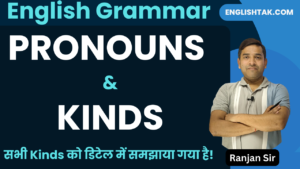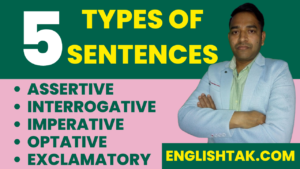![]()
Conditional Sentences in English
Table of Contents
In English grammar, there are four types of conditional sentences: zero conditional, first conditional, second conditional, and third conditional. Each type expresses a different level of probability or possibility. Let’s explore each one with appropriate examples and their Hindi translations.
Generally a conditional sentence starts with conjunctions like “If, When, As soon as” etc.
Types of Conditional Sentences
1. Zero Conditional
2. First Conditional [Open Conditional]
3. Second Conditional [Semi Closed Conditional]
4. Third Conditional [Closed Conditional]
1. Zero Conditional Definition & Examples:
The zero conditional is used to express general truths or facts. It describes situations that are always true when a certain condition is met. The verb tenses used in this type of conditional sentence are usually in the present tense.
Structure :- If + Sub + V1 / V+s/es + Obj, + Sub + V1 / V+s/es + Obj
Example:
If you heat water, it boils.
अगर आप पानी को गर्म करते हैं, तो यह उबलता है। (Agar aap pani ko garam karte hain, toh yeh ubalta hai.)
If it snows, the ground becomes white.
अगर हिमपात होता है, तो ज़मीन सफेद होती है। (Agar himpat hota hai, toh zameen safed hoti hai.)
If you mix red and blue, you get purple.
अगर आप लाल और नीले को मिलाते हैं, तो बैंगनी मिलती है। (Agar aap laal aur neele ko milate hain, toh baingani milti hai.)
If you press the button, the light turns on.
अगर आप बटन दबाते हैं, तो लाइट चालू हो जाती है। (Agar aap button dabate hain, toh light chalu ho jati hai.)
If you don’t water the plants, they die.
अगर आप पौधों को पानी नहीं देते हैं, तो वे मर जाते हैं। (Agar aap paudhon ko pani nahi dete hain, toh ve mar jate hain.)
2. First Conditional Structure & Examples
The first conditional is used to talk about a possible future condition and its probable result. It suggests a real or likely outcome if a particular condition is met. The verb tense in the “if” clause is in the present simple, and the verb tense in the main clause is in the future simple.
Structure :- If + Sub + V1 / V+s/es + Obj, + Sub + shall / will / can / may + V1 + Obj
Example:
If it rains, I will stay at home.
अगर बारिश होती है, तो मैं घर पर रहूंगा। (Agar baarish hoti hai, toh main ghar par rahunga.)
If it rains, I will take an umbrella.
अगर बारिश होती है, तो मैं छाता ले लूँगा। (Agar baarish hoti hai, toh main chhata le lunga.)
If you work hard, you will succeed.
अगर आप मेहनत करेंगे, तो आप सफल होंगे। (Agar aap mehnat karenge, toh aap safal honge.)
If I have time, I will call you later.
अगर मेरे पास समय होता है, तो मैं आपको बाद में कॉल करूँगा। (Agar mere paas samay hota hai, toh main aapko baad mein call karunga.)
If she studies, she will pass the exam.
अगर वह पढ़ाई करेगी, तो वह परीक्षा पास करेगी। (Agar vah padhai karegi, toh vah pariksha pass karegi.)
If we leave now, we will catch the train.
अगर हम अभी निकलें, तो हम ट्रेन पकड़ लेंगे। (Agar hum abhi nikalein, toh hum train pakad lenge.)
Don’t Miss these Posts
Conditional Sentences in English Rules
3. Second Conditional Definition and Examples:
The second conditional is used to talk about an unlikely or hypothetical situation in the present or future and its potential outcome. It describes situations that are unreal or unlikely to happen. The verb tense in the “if” clause is in the simple past, and the verb tense in the main clause is in the present conditional.
Structure :- If + Sub + V2 + Obj, + Sub + would / could + V1 + Obj
Example:
If I had a million dollars, I would buy a yacht.
अगर मेरे पास एक करोड़ डॉलर होते, तो मैं याच्ट खरीदता। (Agar mere paas ek crore dollar hote, toh main yacht kharidta.)
If I had a million dollars, I would travel the world.
अगर मेरे पास एक करोड़ डॉलर होते, तो मैं दुनिया घूमने जाता। (Agar mere paas ek crore dollar hote, toh main duniya ghoomne jaata.)
If I were you, I would take that job offer.
अगर मैं आपके स्थान पर होता, तो मैं उस नौकरी की पेशकश को स्वीकार करता। (Agar main aapke sthan par hota, toh main us naukri ki peshkash ko svikar karta.)
If it rained tomorrow, I would stay indoors.
अगर कल बारिश होती, तो मैं घर में ही रहता। (Agar kal baarish hoti, toh main ghar mein hi rahta.)
If she studied harder, she would pass the exam.
अगर वह और मेहनत करती, तो वह परीक्षा पास करती। (Agar vah aur mehnat karti, toh vah pariksha pass karti.)
If we won the lottery, we would buy a big house.
अगर हम लॉटरी जीतते, तो हम एक बड़े घर खरीदते। (Agar hum lottery jeetate, toh hum ek bade ghar kharidte.)
Conditional Sentences in English Exercise
4. What is Third Conditional?
The third conditional is used to talk about hypothetical past events and their imaginary consequences. It describes situations that did not occur in the past and their hypothetical outcomes. The verb tense in the “if” clause is in the past perfect, and the verb tense in the main clause is in the present conditional perfect.
Structure :- If + Sub + had + V3 + Obj, + Sub + would / could + have + V3 + Obj
Example:
If I had studied harder, I would have passed the exam.
अगर मैं अधिक मेहनत कियी होती, तो मैं परीक्षा पास कर लेता। (Agar main adhik mehnat kiyi hoti, toh main pariksha paas kar leta.)
If she had arrived on time, she would have caught the train.
अगर वह समय पर पहुंची होती, तो उसने ट्रेन पकड़ ली होती। (Agar vah samay par pahunchi hoti, toh usne train pakad li hoti.)
If they had listened to the warning, they wouldn’t have faced the consequences.
अगर उन्होंने चेतावनी की सुनी होती, तो उन्हें परिणामों का सामना नहीं करना पड़ता। (Agar unhone chetavni ki suni hoti, toh unhe parinamon ka samna nahin karna pada.)
If we had left earlier, we wouldn’t have missed the train.
अगर हम पहले निकल जाते, तो हमें ट्रेन छूटने का सामना नहीं करना पड़ता। (Agar hum pehle nikal jate, toh hamein train chhootne ka samna nahin karna pada.)
If I had known the truth, I would have acted differently.
अगर मुझे सच्चाई पता होती, तो मैं अलग ढंग से कार्यवाही करता। (Agar mujhe sachchai pata hoti, toh main alag dhang se karyavahi karta.)
These examples portray hypothetical past events and their imaginary consequences. They express situations that did not occur in the past and their hypothetical outcomes.
Trending Posts on Google
1000 Verbs Forms in English with Hindi
100 Verbs in English with Hindi
Discursive Passage for Class 10th Board 2023-24 Exams
200 Most Common Verbs in English





